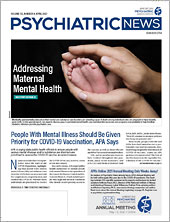“Psychiatry is really complex, essentially complex,” said Adam Brenner, M.D., director of psychiatry residency training at the University of Texas Southwestern Medical Center. “We don’t have the luxury of treating diseases with a single gene or environmental cause. We treat very complex illnesses in the brain, the most complex organ in the body by far.”
That “essential complexity” has important implications for recruiting and training tomorrow’s psychiatrists, Brenner told Psychiatric News, and for how training programs allocate limited educational time and resources.
Brenner will be chairing a session at this year’s online Annual Meeting titled “Is Psychiatry’s Identity in Crisis? Implications for Residency Education.” Panelists will include David Ross, M.D., Ph.D., associate director of the psychiatry residency program at Yale School of Medicine; Sallie DeGolia, M.D., associate director of psychiatry training at Stanford University; John Burruss, M.D., a professor of psychiatry at UT Southwestern; and Tracey Guthrie, M.D., director of the psychiatry residency program at Brown University.
They will explore the question of psychiatry’s identity from the perspectives of health care systems, advances in neurobiology, the place of narrative and psychotherapy, and the emerging awareness of social injustice as a determinant of mental illness.
In October 2019, the New England Journal of Medicine published an editorial titled “Medicine and the Mind—The Consequences of Psychiatry’s Identity Crisis” that highlighted the limitations of an increasing focus on neurobiology. But in an interview with Psychiatric News, Brenner said a historical review of published literature reveals that psychiatry has gone through multiple periods of questioning its identity whenever a new paradigm emerged; each new questioning carried a latent wish that—just around the corner—the field would mature and settle on an identity.
But Brenner said he and speakers at the session will emphasize why identity questions may be intrinsic to the field and should be embraced as an opportunity, not as a crisis, and on how this complexity should guide the educational agenda. “It’s interesting that when you go back over 100 years, you find people debating the same questions in different forms—Are we a part of medicine? Has our scope become too narrow? Are we missing something about social determinants of health or about the brain?”
In an editorial in Academic Psychiatry, Brenner examined this history and concluded that “the concept of psychiatry’s identity is necessarily broad and complex and … provides a foundation for guiding our many responsibilities to our patients and the public at large.”
In comments to Psychiatric News, he said, “We do a disservice when we swing from paradigm to paradigm because we have a hard time holding on to how complex the picture has to be.”
He added, “When it comes to evidence-based psychiatry, the question becomes: What do you include in the evidence base? Certainly, you include randomized, control trials and treatment studies. Now increasingly we need to include basic neurobiology and translational neurobiology. Should it also include sociology to account for the social determinants of health? And what about personal narrative as it emerges in psychotherapy?
“Surely, we need a very broad scope with a very broad base of evidence.”
Such a broad base means program directors need to think carefully about how they shape their training programs. “That’s why we are bringing together experts in neurobiology, health care systems, others who have an interest in narrative and psychotherapy, and others with an interest in disparities and social justice,” Brenner said. “It is our hope that the symposium will help us think about identity and how it can help us do the best possible job of recruiting the best candidates to psychiatry, as well as helping us make difficult choices about how to allocate time and resources during training.” ■
“Is Psychiatry’s Identity in Crisis? Implications for Residency Education” will be held Sunday, May 2, from 4 p.m. to 5:30 p.m.
“Medicine and the Mind—The Consequences of Psychiatry’s Identity Crisis” is posted
here.
The
Academic Psychiatry editorial, “Psychiatry's Identity: Scope, Complexity, and Humility” is posted
here.

